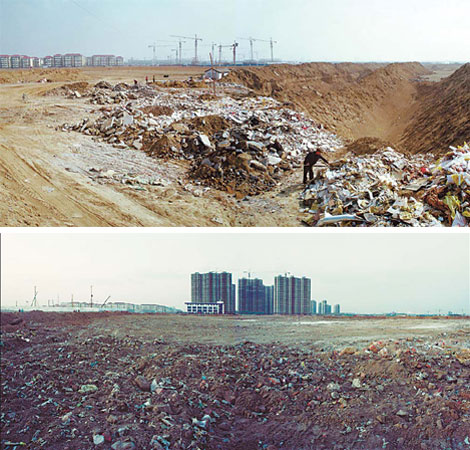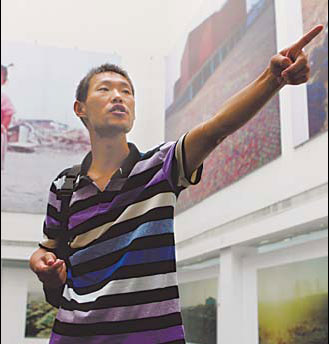Culture
Finding beauty among the trash
By Wendy Qian (China Daily)
Updated: 2010-07-12 10:36
 |
Large Medium Small |
 |
|
A comparison of 2009 and 2010 images of an economic development area in Tongzhou district. A huge hole in the ground seen in the April 2009 photo (top) has been filled by garbage one year later, and high-rise buildings are being built nearby. [Provided to China Daily] |
After a year and a half of taking photos while traveling around the capital's dumpsites in his minivan home, Wang Jiuliang has finally settled down and exhibited his work.
About 130 of his thought-provoking photographs and some grand installations are now on show at Songzhuang Art Gallery.
The 33-year-old freelance photographer says he wanted to capture each dumpsite's enormity, which was the reason why every exhibited photo consists of two connected pictures.
The connecting line is visible. While blurring the line out with software would have been simple, Wang said he did not want to use technology to change his images because people would then question the validity of his other photos from the garbage dumps.
Wang highlights class conflict by contrasting 2009 and 2010 images of the same areas, such as the economic technological development area in Tongzhou district where huge garbage-ridden area disappears in a year to be replaced by commercial buildings for city-dwellers.
Wang even captured garbage dumps on the site where an exposition will take place in 2013.
 |
|
Wang Jiuliang talks about photos he took of garbage dumps at Songzhuang Art Gallery. [Wang Jing / China Daily] |
"I really look forward to people's reactions once they know their exhibition site is built on top of garbage," he said.
Physical proximity of two extremes - the gloss vs the gross - is also juxtaposed to stress the irony.
"From this awful dump, you can see, supposedly, 'Asia's widest building'," Wang said while pointing at a photo of buildings near Chuyingshun township, at the border of Chaoyang and Tongzhou districts.
"At every dump I visited, there were fires burning away. Sometimes, garbage self-ignites, while other times people burn it," Wang said.
According to him, only the big fires attract attention from firefighters.
Despite his passionate criticism of the current situation, Wang is not cynical. He says he wants to cooperate with local governments to help improve policies and environmental education.
Wang talked to officials from the Beijing People's Political Consultative Conference in late June and they decided to publish his works.
Wang believes that working with the government is the "fastest way for change".
He is not simply an environmentalist. He detests NGOs that ask people to live by "ascetic doctrines" or companies that promote their disposable products as being recyclable.
"We have to solve the problem at its root," he said, meaning changing the culture of consumerism.
He mentions the example of a French hotel that provides no disposable products for their guests and that instead reuses everything.
"Their business was not affected," Wang said. "We can do the same."